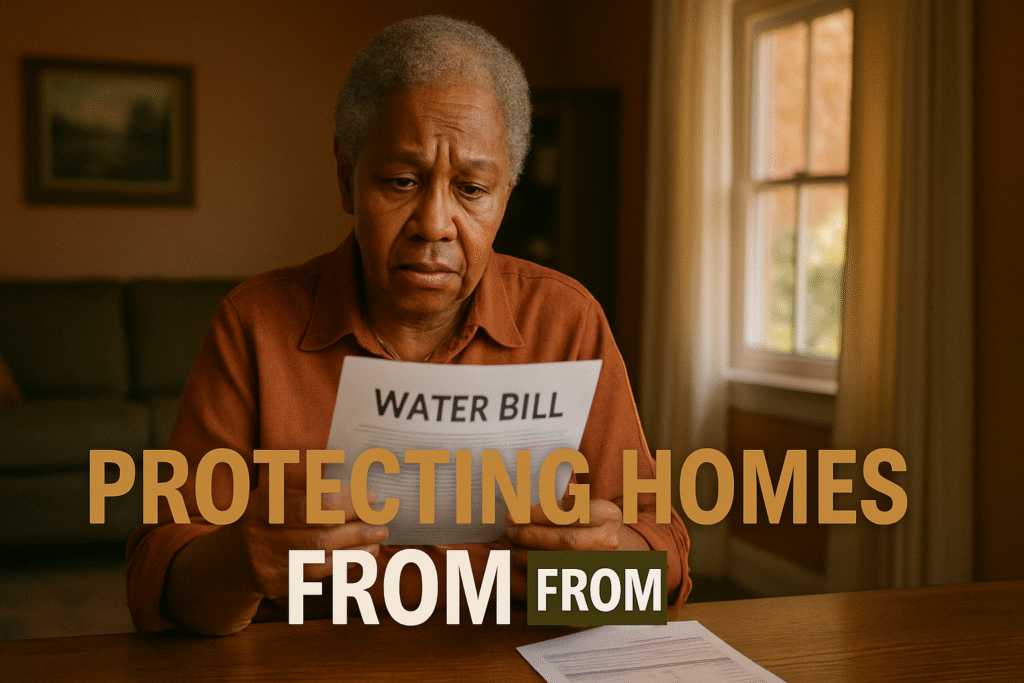

Protecting Homes from Lien Sales
By Darius Spearman (africanelements)
Support African Elements at patreon.com/africanelements and hear recent news in a single playlist. Additionally, you can gain early access to ad-free video content.
The Unseen Threat of Water Bill Foreclosures
Imagine paying off your home, only to lose it over a debt you never knew existed. This is the harsh reality for some homeowners, especially seniors and those on fixed incomes. They face the risk of losing their homes due to relatively small, often unexpected, or disputed debts like water bills and property taxes. For instance, Filmore Brown, a Brooklyn man, lost his home over an unpaid water bill of $5,000, even though he had paid off his mortgage (newsone.com). He claims he never received any notices about the lien.
Similarly, Joyce, another homeowner, is grappling with a $28,000 water bill and fears losing her home (thecity.nyc). She wants to pay but desperately needs a payment plan. She may not qualify for a senior exemption because of her combined income with a co-owner. Another homeowner, Larry Lyttle, spent $15,000 to install a water meter and settle a two-decade-old outstanding water bill (thecity.nyc). In Queens, a woman received a water bill exceeding $20,000, which the NYC Department of Environmental Protection (DEP) upheld, attributing it to a significant leak inside her home (cbsnews.com). These stories highlight a critical issue: small debts can lead to significant losses for vulnerable homeowners.
Understanding Lien Sales
The process of selling tax and water bill liens to trusts or investors can lead to foreclosures and the loss of homes. This often disproportionately affects communities of color. In New York City, unpaid tax or water bills can be sold to a trust or group of investors who then seek to collect the money with interest (newsone.com). If these debts are not paid, the home can go into foreclosure and be sold at auction. More than 6,800 homes in New York City have been placed into a trust for unpaid water bills, with the majority located in communities of color (newsone.com).
A lien sale involves the city selling outstanding property debts, such as unpaid property taxes or water bills, to a private trust (bka.org). This trust then takes over the servicing of the debt and can initiate foreclosure proceedings if the debt remains unpaid. The legal implication is that homeowners can lose their homes through a tax foreclosure process, which is often very difficult to defeat (citylimits.org). These trusts can also charge high interest rates and fees on the debt, making it even harder for homeowners to pay it off (bka.org). Governments have an obligation to collect taxes, but they should also strive to keep people in their homes (abcnews.go.com).
The Foreclosure Process Explained
Unpaid property taxes and water bills become tax liens (legalservicesnyc.org). If these liens are not resolved, they can be sold in a tax lien sale. Once sold, if the debt remains unpaid, the trust that purchased the lien can initiate a tax foreclosure process, which can ultimately lead to the loss of the home (bka.org). This type of foreclosure is very difficult to defeat compared to a mortgage foreclosure (citylimits.org).
The city's billing systems for current charges and debts sold to trusts can be confusing. Many homeowners are unaware that their property is on the lien sale list or that they owe any debt to the city (amsterdamnews.com). This lack of awareness can stem from systemic issues, including potentially ineffective notification processes. For example, Joyce and Azmat Mckenzie were on the lien sale list due to unpaid water bills, despite expecting a representative from the Department of Environmental Protection to help resolve the issue (thecity.nyc). Property-related tax delinquencies have also increased since 2019, and a significant portion of properties listed for the lien sale are due to unpaid water bills (thecity.nyc).
Lien Sale to Foreclosure Process
Disproportionate Impact on Communities of Color
The data shows that most affected properties are in communities of color. This disproportionate impact is a systemic issue. Older properties, which may be more common in these communities, are often harder to maintain (amsterdamnews.com). The costs of utilities, insurance, and repairs, in addition to needing to remain current on taxes, can quickly accumulate. This makes it difficult for homeowners, especially those on fixed incomes, to keep up with expenses and avoid falling into debt that leads to lien sales.
The role of investors who buy liens is also crucial. Investors purchase liens through trusts, and their primary incentive is to profit from the debt (bka.org). They can charge high interest rates and fees. If the debt is not paid, they will pursue foreclosure to recover their investment, potentially leading to the homeowner losing their property (citylimits.org). This system, while legal, raises questions about fairness and ethics, particularly when it impacts vulnerable populations.
Notification Failures and Legal Protections
A significant problem is the lack of effective notification and communication about delinquent bills. This often leaves homeowners unaware of the impending loss of their property. Filmore Brown claims he never received warnings or notices about the pending lien, despite the NYC Department of Finance stating they sent numerous notices (newsone.com). Court documents show investors served someone at Brown's home with foreclosure papers during the pandemic, but he claims he did not receive the notice (newsone.com). His attorneys highlight that he paid thousands in water bills, but the lien debt did not show up on his current bill due to separate payment systems, indicating a need for better notification (newsone.com).
Legislative efforts are underway to protect homeowners from losing their homes due to tax sales, focusing on improved notification and prevention. Pennsylvania state lawmakers are considering House Bill 96, which would allow homeowners to designate a third party to receive copies of delinquent tax notices (abc11.com). Representative Chris Pielli, the bill's sponsor, witnessed many Pennsylvanians lose their homes at tax sales through his work as an attorney conducting guardianship proceedings (abc11.com). The bill aims to ensure that if a house enters the tax sales process, designated individuals are notified in addition to the owner (abc11.com). In New York City, residents who qualify for exemptions such as the Senior Citizen Homeowners Exemption, Veterans Homeowners Exemption, or Disabled Homeowners Exemption should not be included on the lien sale list (amsterdamnews.com).
Senior Exemptions
Residents who qualify for the Senior Citizen Homeowners Exemption, Veterans Homeowners Exemption, or Disabled Homeowners Exemption should not be included on the lien sale list.
Payment Plans
Homeowners may be able to work out a repayment agreement or defer paying their property taxes with the city to avoid foreclosure.
Assistance Programs and Financial Impact
New York City offers various tax exemptions and abatements that can reduce annual property tax burdens (legalservicesnyc.org). Homeowners whose total household income does not exceed $107,300 and who do not own additional properties may also qualify for removal from the lien sale list (amsterdamnews.com). Additionally, homeowners may be able to work out a repayment agreement or defer paying their property taxes with the city to avoid foreclosure (legalservicesnyc.org). While these programs exist, the details on how homeowners can access them, their full eligibility requirements, or their success rates are not always clear.
The financial impact on fixed-income homeowners is severe. Older properties are hard to maintain with utilities, insurance, repairs, and taxes, creating a systemic issue for homeowners (amsterdamnews.com). While exemptions like the Senior Citizen Homeowners Exemption exist to protect certain vulnerable populations, more tailored policy solutions may be needed to address the unique financial challenges faced by these individuals. The issue of disputed water bills due to leaks also lacks clear resolution processes. For example, siblings Joyce and Azmat Mckenzie were on the lien sale list due to a water debt, and a representative from the Department of Environmental Protection was supposed to visit their home to help resolve the issue but did not show up (thecity.nyc). This highlights a gap in support for homeowners facing unexpected and large bills.
ABOUT THE AUTHOR
Darius Spearman has been a professor of Black Studies at San Diego City College since 2007. He is the author of several books, including Between The Color Lines: A History of African Americans on the California Frontier Through 1890. You can visit Darius online at africanelements.org.
